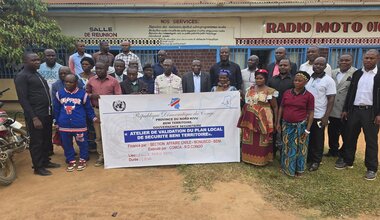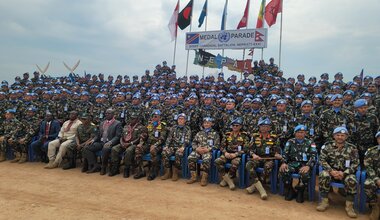Corrections Unit, a new section within MONUSCO
Kinshasa, 21 October 2010 - In order to give a new impetus to the corrections work that its Rule of Law section has undertaken on the ground since 2006 by the United Nations Organisation Stabilisation Mission in the Democratic Republic of Congo (MONUSCO), the UN Secretary-General recommended the creation of a Corrections Unit. This unit is designed to enhance MONUSCO's legislative, organisational and operational support to the country's penitentiary system. The unit not only works with Congolese authorities but operates in synergy with agencies of the United Nations system, international institutions and local non-governmental organisations.
With a staff strength of 70 specialists in penitentiary issues, the unit has the responsibility to advise and support DRC authorities on all areas pertaining to the management of a penitentiary system. These include the organisation of prisons, implementation of programs, security, sentence management, and the organisation of life in prison. Additionally, the unit provides support in reducing the gap between current prison practices and rules, and international prison-related standards.
The Corrections Unit also provides specific support to improve detention and living conditions for prisoners and detainees. According to Youssoupha Ndiaye, acting head of the Corrections Unit, "it is necessary to improve detention conditions, access to safe water and hygiene, and to provide prisons with an effective sanitation system. The budgets for prisons are inadequate. Besides, the concentration of prisoners in the major centres results in overcrowding in the country's detention centres. Prison officers must cope with understaffing and lack of training for personnel. Furthermore, the prison infrastructure is not only in dilapidated conditions but unsuitable for that function."
The situation in Congolese prisons is alarming. The first challenge is redistributing the prison occupancy to deal with prison overcrowding in four provinces: Kinshasa, Katanga, Ituri and North Kivu. Prison overcrowding, coupled with inadequate resources, breeds violence, promiscuity, hunger and disease. This problem of prison overcrowding is rooted in the abnormal length of pre-trial detentions, which in turn arises because the judicial system lacks sufficient capacity. According to the Joint Prison Coordination (which includes the Ministry of Justice, the Ministry of Defence, and MONUSCO), the number of those in pre-trial detention has been growing and has reached over 18,000 in 2010 including 500 women. In contrast, the reported total number of sentenced prisoners does exceed 4,000, including about 100 women.
Poor sanitation conditions are responsible for recurrent epidemics which can not be contained due to infrequent medical visits and lack of medicines. The conditions of juvenile and female detainees are no better.
Except the Ndolo military prison in Kinshasa, which has been built through a MONUSCO Quick Impact project funded by the Netherlands, all other prisons in the country date from the colonial era, and they are generally in ruins. The prison administration is still in the embryonic stage of organisational development, and the needs are enormous with more than 200 prisons and fewer than a hundred nonprofessional staff. Other problems include ineffective security and very little public funding for penitentiary institutions. Prisoners depend largely on international aid as well as support from religious and nonreligious organisations of civil society. Since 2006, MONUSCO has launched and carried out fifty Quick Impact Projects (QIPs) amounting to about 110,000 US dollars. This has contributed to improving infrastructure for central prisons in the country's eleven provinces. MONUSCO also provides continuous training for prison staff.
Detention centres in Western Kasai province are among the neediest. Recently, a parliamentary committee visited the town of Tshikapa where prison conditions were among the poorest in the DRC. The aim of the visit was to assess the management of the penitentiary system. After looking at the situation, the parliamentarians produced a report with their findings that they submitted to budgetary sessions for immediate action.
MONUSCO's Corrections Unit emphasises the importance of the penitentiary system as an essential link in the penal chain, and stresses the need to improve interaction between the prosecution and trial authorities and the prisons, as well as the need to provide authorities with reliable management tools allowing them to define a penitentiary policy that is viable and respectful of human rights.
 UN
UN United Nations Peacekeeping
United Nations Peacekeeping






